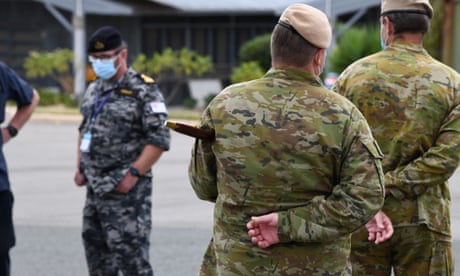- by foxnews
- 08 Apr 2025
Secret report warns of morale and mental health issues among Australia’s elite soldiers
Secret report warns of morale and mental health issues among Australia’s elite soldiers
- by theguardian
- 23 Dec 2022
- in news

A secret report has warned of morale issues and a "high" demand for mental health support services amongst Australia's elite soldiers.
The report warns the defence minister, Richard Marles, that some members of the Special Air Service Regiment have expressed "anger and grief" about the situation. It urges the government to ensure health services are properly resourced.
The document, obtained by Guardian Australia under freedom of information laws, provides an update on the cultural reforms from the Brereton inquiry into alleged war crimes in Afghanistan.
Despite relaying concerns about morale, the independent oversight panel led by the former intelligence watchdog, Dr Vivienne Thom, said it believed "humility" was now embedded in special forces culture.
The panel told Marles it believed "the level of risk of unethical behaviour amongst the SASR members and commandos is at a level where Australia should have that confidence in them".
It said the focus on humility and service to others "dramatically lowers the risk that the special force's unique levels of capability will drive an unhealthy exceptionalism in future".
The four-year-long inquiry by Maj Gen Paul Brereton criticised a "warrior culture" within the SASR, and argued members "should pride themselves on being model professional soldiers, not on being 'warrior heroes'".
Brereton found "credible" information to implicate 25 current or former special forces personnel in the alleged unlawful killing of 39 individuals and the cruel treatment of two others in Afghanistan.
While the criminal allegations are still being considered by the Office of the Special Investigator, Thom's panel is required to update the defence minister on progress in implementing the broader cultural reforms four times a year.
Thom and a fellow panel member, the University of Tasmania vice chancellor Prof Rufus Black, visited Campbell barracks in Western Australia in July to "assess at first hand the current culture within SASR".
"The panel had frank and open conversations with small groups of current SASR members at all rank levels, the SASR command team, ex-service organisations, Australian Special Air Service Association, Defence Member and Family Support and the SASR Auxiliary," said the report dated 1 August.
The panellists encountered "two quite opposing views expressed by SASR members about morale". One of these views was "anger and grief" and the other was "optimism and pride".
The report provided Marles with further details about morale, but these portions were blacked out in the version released under FoI laws.
"The redacted information was obtained on the basis of a mutual understanding of confidence to ensure frank and open conversations with both current and ex-service members as well as non-serving personnel," the decision-maker said in a letter explaining the edits.
Despite these cuts, it is clear the panel wanted the government to maintain "a strong focus on the psychological health and welfare of members and their families".
"The demand on existing services is high and is likely to remain so. Resourcing welfare related support should remain a priority for Defence," the report said.
The panel said the special forces were training members in "mental health first aid".
That was important because it would ensure addressing mental health was "an integral and internal part of being a good soldier in the special forces rather than an external requirement".
The report also found "sophisticated and challenging ethical dilemmas" were increasingly included in special forces' selection, training and reinforcement processes. But the panel mentioned longstanding concerns about "unhealthy tension" between SASR members and rival special forces commandoes.
It said improved definition of the roles of the SASR and commando regiments "should assist in the development of mutual understanding and respect".
The panel gave advice to Marles on whether command accountability has been properly addressed - a long-running source of tension within the special forces community.
The detailed new advice about this issue was redacted, but a previous report to the then defence minister Peter Dutton before the election highlighted "the failure for any accountability to be required from senior officers".
Thom's panel warned then that the failure was "widely resented" and lowering morale.
Marles has since given permission to the chief of the Australian defence force, Gen Angus Campbell, to resume considering administrative action against people in command roles, a process that had been suspended under Dutton.
Marles said last month show-cause notices were issued to "a small number of people" who had held command positions "at troop, squadron and task group level during particular special operation task group rotations".
But the government faced criticism from the Australian special forces community and some politicians, including the Tasmanian senator Jacqui Lambie, who argued the stripping of honours and awards would only be fair if it was also considered higher up the chain of command.
The new panel report warns the government that the "merging of the Afghanistan inquiry report recommendations into the whole-of-Defence transition program means some Brereton report reforms have lost their direct connection to special forces and the urgency needed to meet their future operational requirements".
Marles has declared he is personally committed to implementing the Brereton reforms because "history will judge us on the way in which we manage this".
- by foxnews
- descember 09, 2016
Ancient settlement reveals remains of 1,800-year-old dog, baffling experts: 'Preserved quite well'
Archaeologists have recently unearthed the remarkably well-preserved remains of a dog from ancient Rome, shedding light on the widespread practice of ritual sacrifice in antiquity.
read more


